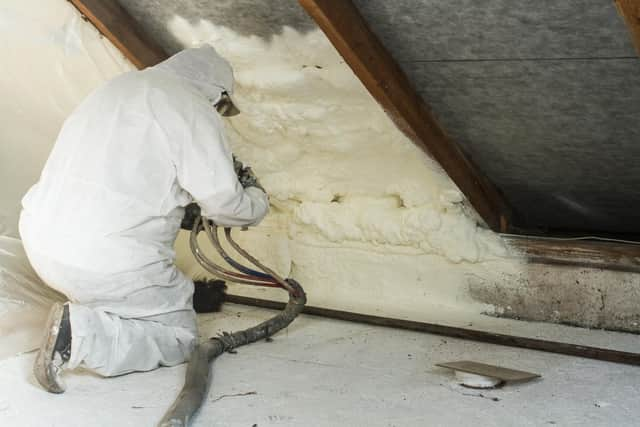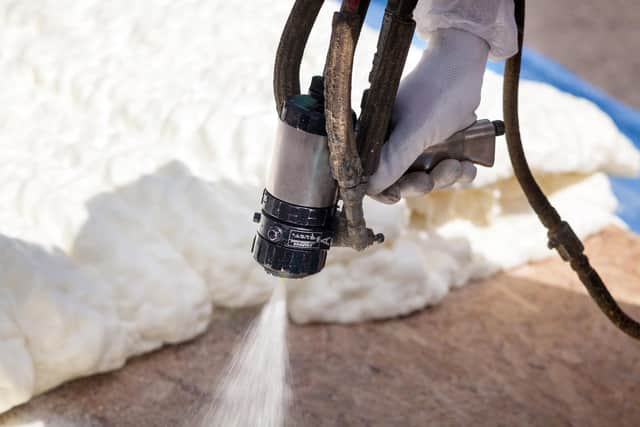Streetwise: Portsmouth woman's heartbreak as foam insulation scam leaves her home virtually worthless
and live on Freeview channel 276
The 78-year-old widow, who now lives in Fareham, was cold-called by a spray foam insulating company in 2019 and persuaded to spend £4,800 under a government backed ‘green deal’ scheme to help slash energy bills.
But just two years down the line she had to pay a further £5,500 to have it removed when she ended up learning she’d been ripped off and her three-bedroom home valued at £360,000 was unsaleable.
Advertisement
Hide AdAdvertisement
Hide AdNot in the best of health, she only discovered the problem when she wanted to downsize to a two-bed bungalow following the death of her husband Arthur.


Susan found that banks and other lenders were unwilling to advance money to potential buyers for properties that had their timbered roof spaces sprayed with foam insulation.
Spray foam insulation has been used for around 30 years and has become increasingly popular in the last decade. But property surveyors warn the foam, which expands and dries solid, can limit air circulation causing roof timber rot and put stress on a building’s structure.
Concerned that homeowners could fall into the same mis-selling trap, Susan wanted to warn others the only way they could sell their home was to pay out thousands of pounds to have it removed.
Advertisement
Hide AdAdvertisement
Hide Ad‘I now know I was scammed by the sales patter,’ she said, ‘but the company who installed it went bust and the work wasn’t guaranteed. I found the so-called guarantees invariably didn’t extend to any damage caused by rogue workmanship or dodgy technology.


‘I was told that it was government approved, I’d save more than £500 a year, and the more than adequate fibreglass roof insulation in my loft was a health hazard about to be declared illegal.
‘I confess I was quite happy with the job at the time, but I’ve had to put up with endless worry and sleepless nights when potential homebuyers kept pulling out of the sale because they couldn’t get a mortgage following a surveyor’s valuation.
‘I was devastated when one interested buyer showed me a survey report which put the value of my home at zero after pointing out it hadn’t been inspected before the spray treatment and I’d been poorly advised.’
Advertisement
Hide AdAdvertisement
Hide AdConstruction writer and former university building lecturer Jeff Howell told Streetwise he’d been warning readers for many years that spraying foam insulation onto the underside of roof slates or tiles was a recipe for disaster.
He said: ‘The claims for the product are a lot of old-rot and can cause irreparable damage to timber battens and rafters. It’s a bad idea and contrary to the building regulations which require a clear 50mm (two inch) ventilated air gap between the insulation and the tiles or slates. If anyone feels the product was mis-sold to them they may wish to discuss it with their local trading standards office.’
The use of spray foam insulation has also been robustly condemned by the Residential Property Surveyors Association (RPSA) and the Property Care Association (PCA) as it could potentially make around 250,000 homes unmortgageable or ineligible for equity release.
They jointly convened a forum of industry stakeholders to consider the use and implication of domestic sprayed foam insulation products. It concluded that unless surveyors had sufficient detailed information given to them by installers at the point of inspection - including the condition of the roof and its flashing both before and after insulation, the type of foam used, and the quality of roof space ventilation, it was unlikely any property professional would speculate on the potential risk.
Advertisement
Hide AdAdvertisement
Hide AdIn what amounted to a damming conclusion they said they had ‘failed to identify any circumstances’ where a roof with this insulation could be given ‘clean bill of health’ and the guidance being offered to its members was to adopt a highly cautious approach recommending removal of the spray foam in almost every case.
The original government ‘green deal’ scheme folded in 2015 after the take up was abysmal but spawned a significant number of dodgy companies seeking the opportunity to exploit the market for home energy improvements.
Scant provision was made to protect consumers from incompetent or scam operators by requiring them to conform to stringent measures to ensure they had procedures in place to provide sufficient detailed pre and post installation records to satisfy a surveyor’s homeowner inspection.
A subsequent government ‘green homes’ grant scheme promptly flopped following criticism about bureaucratic application procedures and householders obtaining cheaper finance through their bank. RPSA chairman Alan Milstein, went on record warning that installers frequently preyed on older vulnerable homeowners and point to certification and ‘quality’ badges to convince people that spray foam will benefit their property.
Advertisement
Hide AdAdvertisement
Hide AdHe added: ‘Sadly, the precise opposite is the case. Owners may find their property difficult, or impossible to sell, that lenders will not offer mortgages or equity release funds and may risk having to spend thousands of pounds replacing their entire roof covering.’
A Streetwise investigation of Companies House records disclosed an inordinate number of spray foam insulation companies had sprung up to take advantage of the government’s green deal scheme.
But many had folded or had been struck off for failing to produce accounts, then resorted to ‘phoenixing’ - a term for a legal loophole enabling under capitalised firms to ditch their debts and resume trading by setting up a replacement company using a similar name to the original one.
A spokesman for Hampshire trading standards said: ‘We are aware of various scams targeting homeowners and we advise people to always be cautious when employing tradespeople to carry out repairs or improvements. Many scams involve tactics which should set off alarm bells, including cold calling, pressure to sign up quickly and spurious claims about government grants. People can find reliable, Trading Standards' approved and verified trades services using our Buy With Confidence scheme via www.buywithconfidence.gov.uk. Further guidance and advice is available from Citizens’ Advice Consumer Service on 0808 223 1133 or www.citizensadvice.org.uk/consumer.’
Streetwise Question and Answers
Q.
Advertisement
Hide AdAdvertisement
Hide Ad‘We’re planning to resume our regular family summer holidays to Spain and hire a car. Last time we were ripped off rotten by a car hire company at Malaga airport when my credit card was debited with £370 of unexpected excess additional charges on our return home. Have you any tips please to avoid getting scammed?’
C.W. (email)
A.
From what you told me it was clear you’d literally bought into all the initial hard sales patter on arrival and agreed to unnecessary additional ‘extras’ like collision damage waiver enhancements.
So, the first tip is always stand your ground and insist you only want the car on the policy terms you initially agreed to. Even if you’re told for example that theft isn’t covered, or towing charges aren’t included, keep your nerve, and simply say you’ll pay them separately if or when the need arises.
By far the single biggest mistake people make is to drive away without thoroughly checking the car over for damage. Whip out the mobile and photograph every panel, remembering to log every scratch and blemish on the vehicle condition report that will be part of the agreement.
Advertisement
Hide AdAdvertisement
Hide AdDon’t forget to check the windscreen for impact damage, the edges of the doors and wing mirrors, and even the wheel hubs for scratches. Photograph them from every angle.
Finally, when your trip has ended and you return the car, make sure the fuel tank is full and the interior is spotless. Get it signed off by the hire company as fine. Keep all the hire paperwork when you get home and regularly check your credit card statements to ensure you’ve not been clobbered with additional charges.
Q.
My wife’s sister has just borrowed £15,000 for a fitted replacement kitchen. I’ve tried to warn her about hiring cowboy kitchen fitters to do the work. Any advice would be welcome.
M. Harrison, Emsworth.
A.
My top tips for avoiding rogue or incompetent tradesmen are plain and simple. First, never employ someone on the basis of a friend’s recommendation unless they are competent tradesmen themselves.
Advertisement
Hide AdAdvertisement
Hide AdSecondly, you only need her to ask two questions to avoid attracting a bunch of cowboys poised to rip her off. They are: “Do you want a deposit or all the money up front, and when can you start the job?”
If the answer to the first question is yes, then she’ll know they’ve no money and the temptation must be to pocket her 15 grand and scarper.
If the answer to the second question is straight away, that’ll tell you they’ve no work on. With a monumental shortage of tradesmen, if they’re as good and competent as they’ll claim to be they should have ongoing work for some weeks ahead. Tell her in no uncertain terms it’s better to wait a while and get the job done properly, rather than end up with her blood boiling over and a kitchen nightmare.
Comment Guidelines
National World encourages reader discussion on our stories. User feedback, insights and back-and-forth exchanges add a rich layer of context to reporting. Please review our Community Guidelines before commenting.